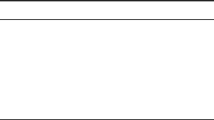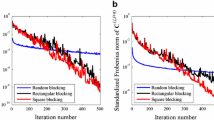Abstract
In this paper we address the questions of perfectly sampling a Gibbs measure with infinite range interactions and of perfectly sampling the measure together with its finite range approximations. We solve these questions by introducing a perfect simulation algorithm for the measure and for the coupled measures. The algorithm works for general Gibbsian interaction under requirements on the tails of the interaction. As a consequence we obtain an upper bound for the error we make when sampling from a finite range approximation instead of the true infinite range measure.
Similar content being viewed by others
References
Dobrushin, R.L.: The description of a random field by means of conditional probabilities and conditions of its regularity. Theory Probab. Appl. 13, 197–224 (1968)
Dobrushin, R.L.: Gibbsian random fields for lattice systems with pairwise interactions. Funct. Anal. Appl. 2, 292–301 (1968)
Dobrushin, R.L.: The problem of uniqueness of Gibbs random field and the problem of phase transition. Funct. Anal. Appl. 2, 302–312 (1968)
Dobrushin, R.L.: Prescribing a system of random variables by conditional distributions. Theory Probab. Appl. 15(3), 458–486 (1970)
Ferrari, P.A.: Ergodicity for spin systems with stirrings. Ann. Probab. 18(4), 1523–1538 (1990)
Ferrari, P.A., Maass, A., Martínez, S., Ney, P.: Cesàromean distribution of groupautomata starting from measures with summable decay. Ergod. Theory Dyn. Syst. 20(6), 1657–1670 (2000)
Galves, A., Garcia, N.L., Löcherbach, E.: Perfect simulation and finitary coding for multicolor systems with interactions of infinite range. Preprint, arxiv.org/abs/0809.3494 (2008)
Georgii, H.O.: Gibbs Measures and Phase Transitions. de Gruyter, Berlin (1988)
Korshunov, D.: On distribution tail of the maximum of a random walk. Stoch. Process. Their Appl. 72(1), 97–103 (1997)
Liggett, T.: Interacting Particles Systems. Springer, Berlin (1985)
Presutti, E.: Scaling Limits in Statistical Mechanics and Microstructures in Continuum Mechanics. Theoretical and Mathematical Physics. Springer, Berlin (2009)
Author information
Authors and Affiliations
Corresponding author
Rights and permissions
About this article
Cite this article
Galves, A., Löcherbach, E. & Orlandi, E. Perfect Simulation of Infinite Range Gibbs Measures and Coupling with Their Finite Range Approximations. J Stat Phys 138, 476–495 (2010). https://doi.org/10.1007/s10955-009-9881-3
Received:
Accepted:
Published:
Issue Date:
DOI: https://doi.org/10.1007/s10955-009-9881-3




